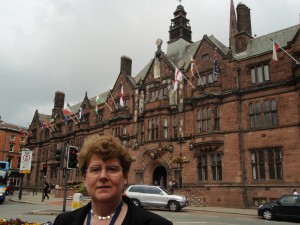“We simply have got to stay and keep helping the people touched by these programs,” says Barbara Tudor with passion and zeal. When she says she is “staying” you know she means it. She is a sturdy sixty-ish woman with curly blond short hair and clear blue eyes. Most striking is her abundant energy, which could vie with the most active teenager.
Tudor may also well be the longest working victim offender mediator in the world.
She is a social worker and gifted restorative justice (RJ) trainer and facilitator who didn’t plan on going into RJ work, but responded to an employment advertisement by the British Parole Office in 1985 looking for someone to do victim advocacy work. The ad mentioned needing someone who had “good communication skills,” which Tudor’s daughter noticed. “It’s perfect for you Mum. You’re a communicator!” Tudor had been working as a sign language interpreter for deaf and mute youth and was looking for a new position when her two daughters and grown more independent.
Luckily for the hundreds of people she has helped, including we professionals trying to hone our restorative skills, Tudor was hired for the job. And since getting it she has been a huge advocate for restorative programs and the people that they help.
“Restorative justice is a humane and rationale response to crime. It is an opportunity for people to heal,” says Tudor. She is balanced in her attention and care for victims, offenders, and the community. She strongly believes after twenty-five years of this work, that RJ programs should be provided as a matter of course by the justice system.
She has fought, with the zeal of a scrappy trial lawyer, sometimes in court, to maintain restorative services for victims through Britain’s probation office.
“What sense does it make to not address the needs of victims after they have been involved in a crime?” she pleads.
She is well spoken and forthright and as the British like to say, “She is brilliant,” and I am “terribly thrilled,” I was able to spend two days with her learning about her approach to not only providing this important work but managing to work with government officials who sometimes are only interested in protected the status quo, even when it causes pain and hardship for the very people they should be protecting.
During my two-day visit with Tudor in England, we toured a prison, met with incarcerated people whom she had trained, and with staff who she also trained in restorative justice.
Her kindness and compassion for people radiates. She stops to help anyone on the street who looks like they need it. Her compassion for imprisoned people is over whelming. “I hope he gets things squared away,” she says hours after bumping into an imprisoned man, she didn’t know, but who needed some assistance that we met in prison.
One of the best lessons I take away as I sit here in Heathrow airport mulling over my last week in the UK, is the gratefulness of a new determination to see Hawai’i implement restorative programs for imprisoned people despite some current state prison administrators and Governor Linda Lingle’s administrative staff who balk at it.
Hawai’i like all our United States belongs to we the people, not only the sometimes-shortsighted bureaucrats and administrators who run it.
Barbara Tudor has successfully kept the British government, which is much savvier and larger than Hawai’i’s barely one million population (which appalling imprisons almost 7000 people, many of whom are thousands of miles away from the islands and their loved ones in private prisons on the continental United States), from severely limiting and eliminating restorative programs.
We will stay the course in Hawai’i too and not give up the fight for what is right and what helps people!
Thank you for the wonderful inspiration Barbara and for all you do directly and indirectly in the UK and beyond for disenfranchised people including victims, offenders and their families.
